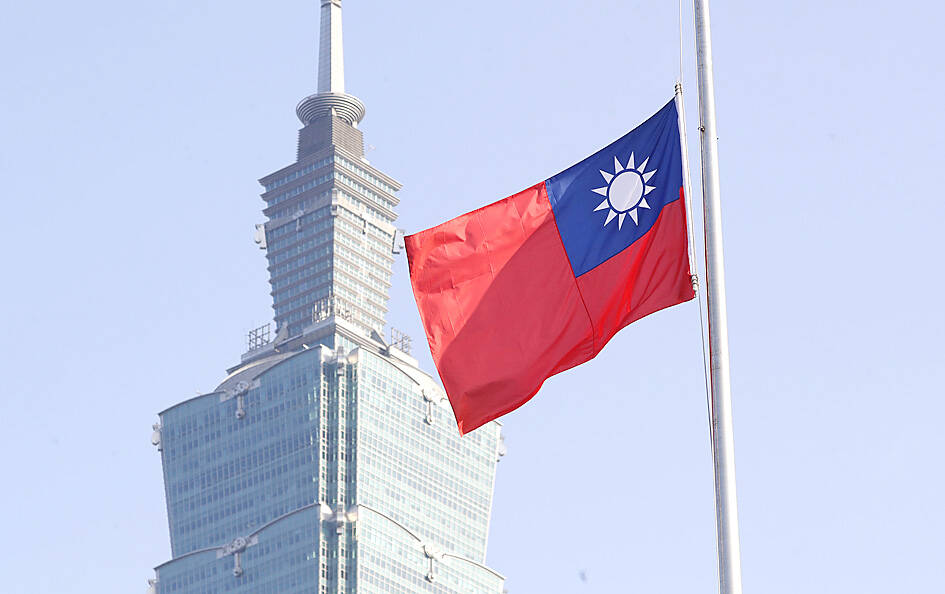China poses the greatest threat to Taiwan’s sovereignty and democracy and is trying to divide Taiwanese society with covert operatives, President William Lai (賴清德) said yesterday.
China has never abandoned its ambitions to annex Taiwan, and its regime poses the greatest threats to Taiwan’s sovereignty and democracy, Lai said at an event in Taipei commemorating the 228 Incident, a 1947 uprising against the then-Chinese Nationalist Party (KMT) government.
Beijing has been recruiting operatives in Taiwan — including gang members, television pundits, political party members, and even retired and active military officers — to “sow division” in society and “attempt to subvert Taiwan,” Lai said, without elaborating.

Photo: Chiang Ying-ying, AP
Lai called on Taiwanese to recognize the nature of authoritarianism so they can better preserve and strengthen Taiwan’s democratic foundation.
The Ministry of National Defense (MND) yesterday said the history of World War II shows that aggression and expansion will end in failure, responding to remarks made by a Chinese Ministry of National Defense spokesperson saying that Taiwan would come into Beijing’s hands sooner or later.
The MND on Wednesday reported that China had designated an area for live-fire drills in international waters about 40 nautical miles (74km) off Kaohsiung and Pingtung County without prior notice.
Asked on Thursday about Taiwan’s annual Han Kuang military exercises this year, China’s defense ministry said Taiwan was “like a mantis trying to stop a chariot” and “sooner or later we will take you back.”
The MND in a statement said that China has been escalating its military threats in the region, destroying the “status quo” of regional stability, and has become the biggest “troublemaker” in the international community.
“This year marks the 80th anniversary of [the end of] World War II, and history has proven that any form of aggression and expansion will end in failure,” it said. “The actions of the communist military in recent years are repeating the mistakes of the invaders and pushing China toward defeat.”
Taiwan’s military is strengthening its forces to safeguard sovereignty, ensure freedom and democracy, and collaborate to maintain security and stability in the region, it added.
Separately, a US Department of State spokesperson on Thursday said that the US is closely monitoring reports of China’s sudden establishment of a live-fire exercise zone near Taiwan.
“China’s continued provocative actions around Taiwan are destabilizing and undermine peace and stability across the Taiwan Strait and in the region,” the spokesperson said in a written statement in response to media queries.
The spokesperson said that the US opposes any unilateral changes to the “status quo” by either side.
“We support cross-strait dialogue, and we expect cross-strait differences to be resolved by peaceful means, free from coercion, in a manner acceptable to people on both sides of the Strait,” the spokesperson added.

FREEDOM OF NAVIGATION: The UK would continue to reinforce ties with Taiwan ‘in a wide range of areas’ as a part of a ‘strong unofficial relationship,’ a paper said The UK plans to conduct more freedom of navigation operations in the Taiwan Strait and the South China Sea, British Secretary of State for Foreign, Commonwealth and Development Affairs David Lammy told the British House of Commons on Tuesday. British Member of Parliament Desmond Swayne said that the Royal Navy’s HMS Spey had passed through the Taiwan Strait “in pursuit of vital international freedom of navigation in the South China Sea.” Swayne asked Lammy whether he agreed that it was “proper and lawful” to do so, and if the UK would continue to carry out similar operations. Lammy replied “yes” to both questions. The

SECOND SPEECH: All political parties should work together to defend democracy, protect Taiwan and resist the CCP, despite their differences, the president said President William Lai (賴清德) yesterday discussed how pro-Taiwan and pro-Republic of China (ROC) groups can agree to maintain solidarity on the issue of protecting Taiwan and resisting the Chinese Communist Party (CCP). The talk, delivered last night at Taoyuan’s Hakka Youth Association, was the second in a series of 10 that Lai is scheduled to give across Taiwan. Citing Taiwanese democracy pioneer Chiang Wei-shui’s (蔣渭水) slogan that solidarity brings strength, Lai said it was a call for political parties to find consensus amid disagreements on behalf of bettering the nation. All political parties should work together to defend democracy, protect Taiwan and resist

By refusing to agree spending increases to appease US President Donald Trump, Spanish Prime Minister Pedro Sanchez threatened to derail a summit that NATO Secretary-General Mark Rutte needs to run smoothly for the sake of the military alliance’s future survival. Ahead of yesterday’s gathering in The Hague, Netherlands, things were going off the rails. European officials have expressed irritation at the spoiler role that Sanchez is playing when their No. 1 task is to line up behind a pledge to raise defense spending to 5 percent of GDP. Rutte needed to keep Spain in line while preventing others such as Slovakia

SHIFT PRIORITIES: The US should first help Taiwan respond to actions China is already taking, instead of focusing too heavily on deterring a large-scale invasion, an expert said US Air Force leaders on Thursday voiced concerns about the Chinese People’s Liberation Army’s (PLA) missile capabilities and its development of a “kill web,” and said that the US Department of Defense’s budget request for next year prioritizes bolstering defenses in the Indo-Pacific region due to the increasing threat posed by China. US experts said that a full-scale Chinese invasion of Taiwan is risky and unlikely, with Beijing more likely to pursue coercive tactics such as political warfare or blockades to achieve its goals. Senior air force and US Space Force leaders, including US Secretary of the Air Force Troy Meink and